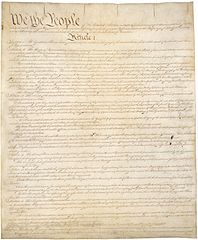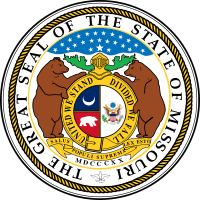June 1, 2022 •
Oklahoma Legislature Adjourns, Plans Special Veto Session
The Oklahoma Legislature adjourned its regular session on May 27 without referring any measures to the 2022 ballot for voters to consider. During the session, lawmakers considered referring constitutional amendments and state statutes to the ballot. Fifteen constitutional amendments and […]
The Oklahoma Legislature adjourned its regular session on May 27 without referring any measures to the 2022 ballot for voters to consider.
During the session, lawmakers considered referring constitutional amendments and state statutes to the ballot. Fifteen constitutional amendments and one state statute had passed in the chamber of origin but did not receive final approval in the opposite chamber before adjournment.
Proposed constitutional amendments must be referred to the ballot and receive voter approval to be enacted. To put a proposed constitutional amendment on a ballot, a simple majority vote of all members in both the Senate and House is required.
Legislators will return in June for a special veto session to address eliminating the state’s 4.5% grocery tax and reducing the personal income tax.
July 22, 2021 •
North Dakota Voter Petitions Circulating
North Dakota Secretary of State Al Jaeger approved petitions for term limits, changes to the constitutional amendment process, and to recall state House District 24 Rep. Dwight Kiefert. The term limits petition would limit the governor and legislators to eight […]
North Dakota Secretary of State Al Jaeger approved petitions for term limits, changes to the constitutional amendment process, and to recall state House District 24 Rep. Dwight Kiefert.
The term limits petition would limit the governor and legislators to eight years of service, though lawmakers could serve up to eight years each in the House of Representatives and the Senate.
The measure also prohibits the Legislature from proposing a constitutional amendment to eliminate the term limits in the future.
The petition to change the process for constitutional amendments would raise voter approval from a simple majority to 60% and limit ballot measures to a single issue.
The petition by a group of lawmakers to recall Kiefert is in response to his vote to expel a colleague accused of sexual harassment earlier this year.
He is one of several representatives who were censured for the vote to expel Rep. Luke Simmons.
Each petition group has one year to gather the required number of signatures.
April 21, 2021 •
Idaho Amendment Passes the House
The Idaho House of Representatives passed a proposed constitutional amendment to allow lawmakers to call themselves back into special session. The amendment would allow lawmakers to call themselves back whenever at least 60% of members of each body agree to […]
The Idaho House of Representatives passed a proposed constitutional amendment to allow lawmakers to call themselves back into special session.
The amendment would allow lawmakers to call themselves back whenever at least 60% of members of each body agree to the special session.
Senate Joint Resolution 102 now goes to the Office of the Secretary of State, who will draw up the exact wording of the ballot measure to be voted on in the 2022 November General Election.
March 19, 2021 •
Kentucky Voters Will Decide Legislative Session Changes in 2022
The Kentucky General Assembly voted to place a constitutional amendment on the November 2022 ballot authorizing the Legislature to change the legislative session end dates with a three-fifths vote in each chamber. The proposed amendment also authorizes the Senate president […]
The Kentucky General Assembly voted to place a constitutional amendment on the November 2022 ballot authorizing the Legislature to change the legislative session end dates with a three-fifths vote in each chamber.
The proposed amendment also authorizes the Senate president and House speaker to jointly call special sessions lasting up to 12 days annually.
Currently, only the governor can call a special session.
The amendment also removes specific legislative session end dates from the constitution and instead provides legislative sessions in odd-numbered years are limited to 30 legislative days and sessions in even-numbered years are limited to 60 legislative days.
The amendment also changes the date legislation is effective from 90 days after the General Assembly adjourns sine die to July 1 or 90 days after signed into law, whichever is later.
This constitutional amendment will be effective upon voter approval.
November 4, 2020 •
North Dakota Voters Defeat Constitutional Amendment
Voters defeated a constitutional amendment changing the membership and meeting requirements of the state board of higher education. The failure of the measure keeps the number of individuals who serve on the state board of higher education at eight and […]
Voters defeated a constitutional amendment changing the membership and meeting requirements of the state board of higher education.
The failure of the measure keeps the number of individuals who serve on the state board of higher education at eight and their terms of membership at four years.
The amendment would have increased board membership to 15 and increased membership terms to six years and prohibited state legislators, elected state officials, and full-time state employees from serving on the board.
As of Wednesday morning, with 91% of the votes counted, the measure was overwhelmingly defeated by 45%.
November 4, 2020 •
Missouri Voters Defeat Constitutional Amendment
Missouri voters defeated a constitutional amendment that would have extended term limits currently applicable to the governor and treasurer to all statewide elected officials. The failure of the amendment does not affect the term limits currently applicable to the governor […]
Missouri voters defeated a constitutional amendment that would have extended term limits currently applicable to the governor and treasurer to all statewide elected officials.
The failure of the amendment does not affect the term limits currently applicable to the governor and treasurer under Article IV, Section 17 of the Constitution.
Namely, that no person shall be elected governor or treasurer more than twice, and no person who has held the office of governor or treasurer, or acted as governor or treasurer, for more than two years of a term to which some other person was elected to the office of governor or treasurer shall be elected to the office of governor or treasurer more than once.
The amendment needed to receive a majority of votes to pass and as of Wednesday morning was defeated by only 4% with 98% of the votes counted.
November 4, 2020 •
New Mexico Voters Approve Public Official Term Limits Amendment
On November 3, voters in New Mexico approved a constitutional amendment to allow the legislature to adjust the term of a state, county, or district officer. House Joint Resolution 8, or Amendment 2, allows the legislature to adjust the term […]
On November 3, voters in New Mexico approved a constitutional amendment to allow the legislature to adjust the term of a state, county, or district officer.
House Joint Resolution 8, or Amendment 2, allows the legislature to adjust the term of a state, county, or district officer to align or stagger the election of officers for a particular state, county, or district office throughout the state.
Additionally, the amendment will clarify that officers elected to fill a vacancy in office must take office on the first day of January following their election.
The amendment became effective upon voter approval.
As of 7:00 a.m. November 4, with 96% of the precincts reporting, the amendment passed 64% to 35.7%.
November 4, 2020 •
Arkansas Voters Approve Legislative Term Limits Amendment
On November 3, voters in Arkansas approved a constitutional amendment to impose term limits for state legislators. Issue 2 creates term limits of 12 consecutive years for state legislators with the opportunity to return after a four-year break. Arkansas previously […]
On November 3, voters in Arkansas approved a constitutional amendment to impose term limits for state legislators.
Issue 2 creates term limits of 12 consecutive years for state legislators with the opportunity to return after a four-year break.
Arkansas previously had a 16-year lifetime term limit for state legislators.
The 12-year limit will apply to anyone elected in 2021 or after.
Those first elected to the legislature before 2021 will keep the state’s existing term limit of 16 years, but they will be eligible to run for election again after four years.
As of 7:00 a.m. November 4, with more than 95% of the precincts reporting, the amendment passed 55.4% to 44.6%.
November 4, 2020 •
Utah Voters Approve Session Start Date Amendment

Utah Capitol Building - Jkinsocal
On November 3, voters in Utah approved a constitutional amendment to modify the commencement date of the annual Utah legislative session. Senate Joint Resolution 3, or Amendment F, amends the commencement of the legislature from the fourth Monday in January […]
On November 3, voters in Utah approved a constitutional amendment to modify the commencement date of the annual Utah legislative session.
Senate Joint Resolution 3, or Amendment F, amends the commencement of the legislature from the fourth Monday in January to a day in January designated by state statute.
Previously, if the state legislature wished to change the session start date, lawmakers would need to amend the state constitution by passing a constitutional amendment by a two-thirds vote of the legislature.
The amendment would then require statewide voter approval.
Under Amendment F, the legislature will be able to change the session start date in state statute, which requires a simple majority vote in the legislature and does not require voter approval.
The amendment also excludes state holidays that are not also federal holidays from counting toward the 45-day limit of annual general sessions.
Amendment F will take effect January 1, 2021.
As of 7:00 a.m. November 4, with more than 76% of the precincts reporting, the amendment passed 66.8% to 33%.
May 7, 2020 •
Lawsuit Filed in North Dakota Redistricting Case
The Office of the North Dakota Secretary of State approved a petition for a proposed constitutional amendment. This amendment will make several changes to election procedures, and make the Ethics Commission responsible for state legislative redistricting procedures. The Legislature is […]
The Office of the North Dakota Secretary of State approved a petition for a proposed constitutional amendment.
This amendment will make several changes to election procedures, and make the Ethics Commission responsible for state legislative redistricting procedures.
The Legislature is responsible for redrawing district lines every 10 years following each U.S. Census and is scheduled to do so again in 2021.
The group proposing the measure, North Dakota Voters First, will need to obtain signatures of 4% of eligible voters by July 6 to get the proposal on the ballot in November.
The group has now filed a lawsuit against Secretary of State Al Jaeger in U.S. District Court claiming it should be allowed to collect electronic signatures during the pandemic.
The state law requiring petition circulators to collect necessary signatures in-person is unrealistic and dangerous.
Additionally, the inability to get the measure on the ballot this year would mean the current redistricting rules stay in place for another decade.
January 4, 2017 •
Cruz and DeSantis Propose Term Limit Constitutional Amendment
On January 3, U.S. Sen. Ted Cruz and U.S. Rep. Ron DeSantis proposed an amendment to the U.S. Constitution to impose term limits on members of Congress. The amendment would limit Senators to two six-year terms and House members to […]
 On January 3, U.S. Sen. Ted Cruz and U.S. Rep. Ron DeSantis proposed an amendment to the U.S. Constitution to impose term limits on members of Congress. The amendment would limit Senators to two six-year terms and House members to three two-year terms.
On January 3, U.S. Sen. Ted Cruz and U.S. Rep. Ron DeSantis proposed an amendment to the U.S. Constitution to impose term limits on members of Congress. The amendment would limit Senators to two six-year terms and House members to three two-year terms.
In a press release, Cruz states, “The time is now for Congress, with the overwhelming support of the American people, to submit this constitutional amendment to the states for speedy ratification.”
The election of a person filling a vacancy in the House would be counted as one term if the person fills the vacancy for more than one year. In the Senate, the vacancy would have to be filled for more than three years to be counted.
September 20, 2016 •
Constitutional Amendment to Limit Campaign Contributions to Appear on Missouri Ballot
With the Missouri Supreme Court denying an appeal of two lower court rulings, a constitutional amendment reinstating campaign contribution limits will appear on the November ballot. State contribution limits, originally approved by voters in 1994, were repealed by the General […]
 With the Missouri Supreme Court denying an appeal of two lower court rulings, a constitutional amendment reinstating campaign contribution limits will appear on the November ballot. State contribution limits, originally approved by voters in 1994, were repealed by the General Assembly in 2008.
With the Missouri Supreme Court denying an appeal of two lower court rulings, a constitutional amendment reinstating campaign contribution limits will appear on the November ballot. State contribution limits, originally approved by voters in 1994, were repealed by the General Assembly in 2008.
If passed, the 2016 ballot measure would ban direct corporate and labor union contributions and limit individual and committee contributions to statewide candidates to $2,600 per election. Contributions to political parties would be capped at $25,000 per election.
August 17, 2016 •
Ethics Bills Hit Alabama Special Session
The primary focus of the current special session is to pass a constitutional amendment allowing a statewide lottery (Senate Bill 11). If the constitutional amendment passes, members of the Alabama Lottery Commission would be subject to the Ethics Law. Legislators […]
 The primary focus of the current special session is to pass a constitutional amendment allowing a statewide lottery (Senate Bill 11).
The primary focus of the current special session is to pass a constitutional amendment allowing a statewide lottery (Senate Bill 11).
If the constitutional amendment passes, members of the Alabama Lottery Commission would be subject to the Ethics Law. Legislators are using the special session to introduce several ethics bills.
If all of the bills pass, any individual convicted of a felony would be prohibited from registering as a lobbyist (House Bill 32), any legislator indicted on a felony would be automatically suspended from any leadership position (House Bill 11), and public school employees would be allowed to accept gifts from students (House Bill 10).
May 19, 2016 •
Arkansas Attorney Seeks Preliminary Injunction Against Attorney General Over Ballot Initiative
On May 13, attorney David Couch petitioned the Arkansas Supreme Court to issue a preliminary injunction requiring Attorney General Leslie Rutledge to approve the language of his ethics initiative or offer an alternative as any further delay could cause “irreparable” […]
 On May 13, attorney David Couch petitioned the Arkansas Supreme Court to issue a preliminary injunction requiring Attorney General Leslie Rutledge to approve the language of his ethics initiative or offer an alternative as any further delay could cause “irreparable” harm to Couch’s attempt to get the constitutional amendment on the ballot.
On May 13, attorney David Couch petitioned the Arkansas Supreme Court to issue a preliminary injunction requiring Attorney General Leslie Rutledge to approve the language of his ethics initiative or offer an alternative as any further delay could cause “irreparable” harm to Couch’s attempt to get the constitutional amendment on the ballot.
Couch cannot began collecting the 84,859 signatures due by July 8, until Rutledge approves the language.
If approved by voters, the proposed constitutional amendment would prohibit certain gifts from lobbyists to elected officials and lower campaign contribution limits.
State and Federal Communications, Inc. provides research and consulting services for government relations professionals on lobbying laws, procurement lobbying laws, political contribution laws in the United States and Canada. Learn more by visiting stateandfed.com.

